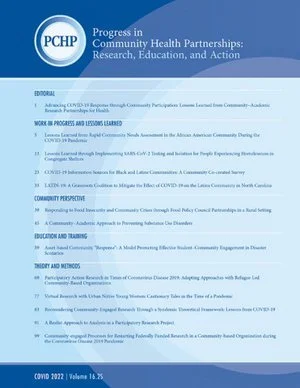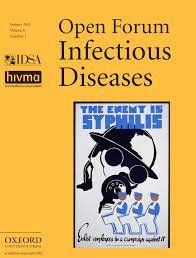July 2024
¿No Hay Racismo?: application of the levels of racism framework to Latinx perspectives on barriers to health and wellbeing
By Gabriela Plasencia, Kamaria Kaalund, Rohan Gupta, Viviana Martinez-Bianchi, Rosa Gonzalez-Guarda, Jessica Sperling, and Andrea Thoumi
This study explores systemic racism's impact on Latinx communities in North Carolina during the COVID-19 pandemic. It uses the Levels of Racism framework by Dr. Camara Jones to analyze discussions among community health workers and leaders, highlighting issues like unequal access to resources, cultural insensitivity, and exclusionary policies. The findings underscore how Latinx populations often do not explicitly identify racism, which impedes their ability to advocate for systemic change. The research calls for community-informed, anti-racist policies to address these longstanding barriers.
October 2023
Training Latinx Community Health Workers as Clinical Research and Health Care System Navigators
By Gabriela Plasencia MD, MAS, Kamaria Kaalund BA, and Andrea Thoumi MPP, MSc
The article "Training Latinx Community Health Workers as Clinical Research and Health Care System Navigators" emphasizes the pivotal role of community health workers (CHWs), or promotores de salud, in bridging gaps between Latinx communities and health systems. While CHWs enhance health outcomes by offering culturally relevant information and fostering trust, they often lack formal research training. The authors advocate for developing standardized research curricula tailored to CHWs, co-created with community input, to bolster their roles in research and policy advocacy. Such training can empower CHWs to identify community health challenges, analyze data, and influence policy, ultimately improving health equity for Latinx populations
November 2023
Promoting Latinx health equity through community-engaged policy and practice reforms in North Carolina.
By Andrea Thoumi, Gabriela Plasencia, Farrah Madanay, Ethan Shih-An Ho, Caroline Palmer, Kamaria Kaalund, Nikhil Chaudhry
Frontiers Public Health
We utilized the National Institute on Minority Health and Health Disparities (NIMHD) Research Framework to conduct a directed content analysis of 58 LATIN-19 meeting minutes from April 2020 through October 2021.
November 2023
Systemic Racism Affecting Latinx Population Health During the COVID-19 Pandemic and Beyond: Perspectives of Latinx Community Health Workers and Community-Based Organization Leaders.
By Gabriela Plasencia, Rohan Gupta, Kamaria Kaalund, Viviana Martinez-Bianchi, Rosa Gonzalez-Guarda, and Andrea Thoumi
Health Equity
The purpose of this study is to identify forms of systemic racism experienced by Latinx communities in North Carolina during the COVID-19 pandemic as identified by Latinx community health workers (CHWs) and community-based organization (CBO) leaders.
July 2023
Acculturative Stress, Resilience, and a Syndemic Factor Among Latinx Immigrants
By Rosa Gonzalez-Guarda, Brian McCabe, Gabriela Nagy, Allison Stafford, Lisvel Matos, Min Lu, Irene Felsman, Pillar Rocha-Goldberg, Richard Cervantes
Nursing Research
The purpose of this study was to describe the influence of acculturative stress and resilience on the syndemic factor underlying substance abuse, intimate partner violence, HIV risk, and mental conditions.
June 2023
Applying Lessons From Major Public Health Accomplishments to Firearm Injuries in the US
By Rosa Gonzalez-Guarda
JAMA Health Forum
This JAMA Forum discusses policies that reduce access to guns, reengineering to improve firearm safety and hyperlocal community-led responses in marginalized communities.
September 2022
Promoting Health Equity in the Latinx Community, Locally and Globally: The Duke University School of Nursing Model
By Rosa Gonzalez-Guarda, Irene C Felsman, Rosa Solorzano
Nursing Clinics of North America
The Latinx population in the United States is the largest racial and ethnic minoritized group in the United States that experiences significant health disparities. Schools of nursing can play an important role in promoting health equity among Latinx communities through their academic missions of education, research, and service.
March 2022
LATIN-19: A grass-roots coalition to mitigate the effect of COVID-19 on the Latinx community in North Carolina.
By Gabriela M. Maradiaga Panayotti, Viviana Martinez-Bianchi, Leonor Corsino, Mina Silberberg, Leah L. Zullig, Irene C Felsman, Rosa Gonzalez-Guarda, Gabriela A. Nagy, Pilar Rocha, Edgar Vergara, Luke Smith, Alejandro Peña, Isa Granados, Danielle Kennedy, Kathryn I. Pollak
Progress in Community Health Partnerships: Research, Education, and Action
Study of the grassroots collaboration created by LATIN-19, looking at the challenges and solutions that LATIN-19 addressed and the impact of their work on community partners and members.
November 2021
By Andrea Thoumi, Keren Hendel, Sebastian Gutierrez, Nikhil Chaudhry, and Viviana Martinez-Bianchi.
Health Affairs Forefront
The experiences of the LATIN-19 coalition provide three key lessons to embed health equity principles in health policy: Elevate community voices, strengthen meaningful community partnerships, and create care delivery models that reach people where they are.
September 2021
Mobile Health Clinics to Mitigate COVID-19 Systemic Barriers
By Nikhil Chaudhry, Bass student and intern at the Duke-Robert J. Margolis, MD, Center for Health Policy
Duke Global Health Institute, September 30, 2021
Chaudhry’s essay won first place in the policy opinion and analysis category of the Student Collaborative on Health Policy summer writing competition. He offers ideas for closing the gap in access to COVID-19 testing and vaccinations for Black and Latinx communities
July 2021
In the Path of the Storm: North Carolina’s Response to COVID-19’s Impact on Historically Marginalized Populations
By Michelle Laws and Viviana Martinez-Bianchi
North Carolina Medical Journal
The COVID-19 pandemic did not create health disparities among African American, Latinx, and American Indian populations, but it illuminated ways that systemic and long-term structural inequities create cumulative disadvantages for historically marginalized populations. This article highlights strategies implemented by the Historically Marginalized Populations Workgroup of the North Carolina Department of Health and Human Services to mitigate COVID-19’s impact.
July 2021
By LATIN-19
North Carolina Medical Journal
LATIN-19 members describe their work and successes during the pandemic, along with plans to extend their mission beyond COVID-19 to address other health inequities among the Latinx community.
January 2021
Racial, Ethnic, and Geographic Disparities in Novel Coronavirus (Severe Acute Respiratory Syndrome Coronavirus 2) Test Positivity in North Carolina
By Nicholas A Turner, William Pan, Viviana S Martinez-Bianchi, Gabriela M Maradiaga Panayotti, Arrianna M Planey, Christopher W Woods, Paul M Lantos
Open Forum Infectious Diseases
Emerging evidence suggests that black and Hispanic communities in the United States are disproportionately affected by coronavirus disease 2019 (COVID-19). A complex interplay of socioeconomic and healthcare disparities likely contribute to disproportionate COVID-19 risk.














